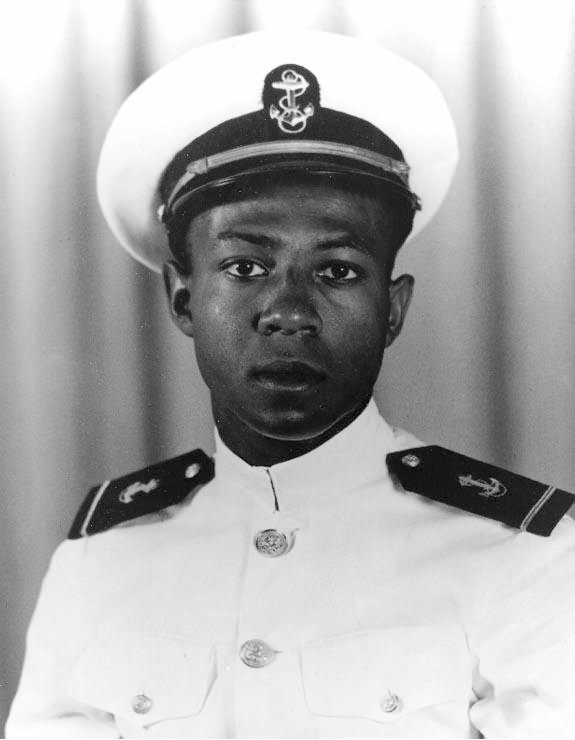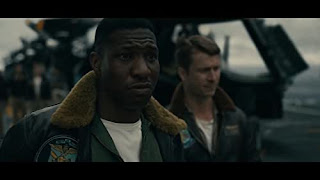"Inspired by a true story" is a poor way to sell a story like Devotion. What could have been and should have been an exciting, insightful true-life tale ended up bloated, lethargic and blank.
In 1950, Naval Ensign Jesse Brown (Jonathan Majors) is the only African-American in his squadron. This, in a surprising and positive turn, is of no importance to the other pilots, including newly-arrived pilot Tom Hudner (Glen Powell).
Brown very reluctantly works with Hudner, whom he does not dislike but is wary of. For his part, Hudner is more than willing to work with, even be friends with Brown. A tentative working relationship begins between them, one encouraged by Brown's devoted wife Daisy (Christina Jackson).
It is not long before Brown and Hudner's squadron are ordered to the Mediterranean. Here, Brown encounters actress Elizabeth Taylor (Serinda Swan) while on shore leave at Cannes. She invites him and his fellow officers to a night at the casino, and this is the rare non-work adventure they share.
As 1950 draws to a close, the long-feared war in Korea finally breaks out. The squad takes the fight to the North Korean-Chinese border, but Brown does not survive. Hudner is determined to try and save Brown, but cannot. He, however, has kept his pledge to Daisy: not to save him, but to stay with him.
We are told in a post-script that the search for Ensign Brown's remains continues.
I think many who praised Devotion wondered why and how the film failed. Among the elements is the generic title. Granted, the film is based on the nonfiction book Devotion: An Epic Story of Heroism, Friendship and Sacrifice by Adam Makos. However, the longer book title at least gives one an idea of what the story is about. "Devotion" as a film title is more opaque. Devotion to what? Country? Family? Fellow Navy fighters? Elizabeth Taylor?
Devotion is a very bland title, though perhaps in retrospect it is fitting for a surprisingly bland film. This is a rich subject tackling war, race, the comradeship of fighters, and yet things moved so slowly and haphazardly. Nothing really sticks, making the two-hour-nineteen-minute running time feel longer. I did ask myself at one point, "When is this going to end?", a terrible thing to wonder for any film, let alone one as sincere as Devotion.
Elements are constantly hit on that never go anywhere. We see Ensign Brown talk to himself using racist language (ostensibly to shield himself for when he came across it), but Devotion rarely showed any elements of racism thrown at him. The worse I can remember is when the snooty French doormen initially refused him entry to the Cannes casino.
To be fair, I was slipping in and out of consciousness during the film, so I might have missed something. However, apart from this and having an unpleasant neighbor who called the police on the Browns for having loud music, I cannot recall any major incidents where race played a role.
I should be happy that Devotion opted out of the easy, safe and predictable route of having his fellow Navy pilots be unhappy or uncomfortable with a "colored" aviator. Brown's fellow pilots got on rather well with him, though found him deliberately standoffish. It is, however, strange that Devotion both included and excluded the race element. At one point, the other black crewmen seemed interested in seeing a fellow African-American fly, but as far as I remember there is little to no mention of their involvement towards or with Brown.
It is also surprising to see how France was seeing as more openly racist given how often France has been seen as more welcoming to African-Americans like Josephine Baker and James Baldwin.
I think it is because Jake Crane and Jonathan Stewart's adaption simply did not know what it wanted to say. Was it an "overcoming racism" film? Was it a "war film"? Was it a "band of brothers" film? Was it an "inspirational true story" film"? It was none of these, though I suspect it was because it was trying to be all.
J.D. Dillard's directing did not help. It was not as if the actors did not try, but sometimes one is aghast at how bland they all were. In what was meant to be a moving moment, one of the flyers is facing death when he cannot correct his landing. The flyer, Mohring (Nick Hargrove), ultimately fails and crashes.
This scene should be studied by future filmmakers and actors to show what not to do. As acted by Majors and Powell, there is not a drop of emotion, of urgency, of concern over their fellow flyer potentially being killed right in front of them. For all we know, they could have been talking about Mohring ordering everyone sandwiches.
Once his plane does crash, Dillard has the characters stay put, not out of shock but out of a bizarre disconnect bordering on disinterest. No one seems horrified. No one seems upset. No one moves for seconds. Even as they stare at the wreckage, there does not seem to be much concern. This is supposed to be a death among the band of brothers, but despite the film's desperate efforts to make one care, one doesn't.
It also does not help that I would not have been able to tell you who Mohring was or what his role in Devotion was. That goes for anyone not named Jonathan Majors or Glen Powell.
A takeaway from Devotion was my confusion over how I thought Joe Jonas had already been in a World War II film. In reality, I was confusing Joe Jonas with Nick Jonas from Midway. Is it to the point that the Jonas Brothers are that interchangeable that I literally could not tell the difference between Joe and Nick?
Again, the actors in Devotion tried hard to make things worth the time. Jackson's Daisy is the best of the lot. In her all-too-brief scenes, she did the best she could with the material to make Daisy a loving but concerned wife.
The other actors too did the best they could with what they had. It is interesting that Powell played Lieutenant Hudner. This is the third time Powell has played a Navy pilot after Hidden Figures and Top Gun: Maverick. It's gotten to the point where a friend of mine literally asked me if Powell had served in the military before becoming an actor (he hadn't). I'm sure Powell has done other films where he isn't flying combat missions, but "Glen Powell as a military character" is coming close to parody. Here, he is shockingly bland and distant, almost like a nice guy who just wandered onto the set and decided to say lines.
Majors too did what he could as Ensign Brown. His best moments were with Jackson, where he could show a nice connection to Mrs. Brown. He did his best too when he is facing death or showing some irritation about the flight report that detailed him disobeying orders (even if the results were beneficial). However, try as he might, the efforts at "stoic" ended up as "bored".
Again and again, Devotion's greatest flaw is the screenplay. At a battle, we hear from two soldiers. "You want a prayer? Dear God, send us some angels," one of them says, and at that moment the Navy fighters come in. I found that a bit too on-the-nose and predictable.
Devotion somehow, despite its best efforts and intentions, ended up making a case that a documentary about Ensign Jesse Brown would have been better than the biopic we got. He deserves a lot better than Devotion.
 |
| 1926-1950 |
.jpg)


No comments:
Post a Comment
Views are always welcome, but I would ask that no vulgarity be used. Any posts that contain foul language or are bigoted in any way will not be posted.
Thank you.